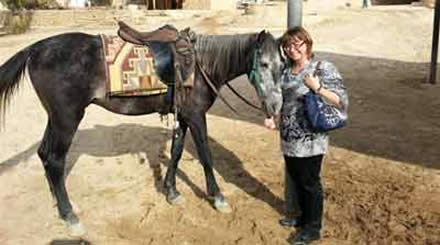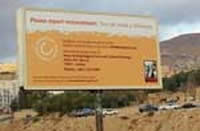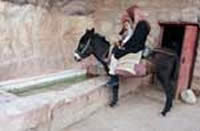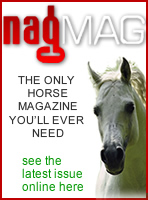
Horseytalk.net Special Interview
Petra Ingram
Brooke Chief Executive in Petra, Jordan
It is clear that tourists have a great influence over the horse owners, and for those who recognise bad behaviour, they could help us improve welfare by refusing to use horses who are tired or suffering from wounds
 Says Petra Ingram,
Says Petra Ingram,
Brooke, chief executive
It is such a magnificent view, looking down from the mountains on the approach road to Wadi Musa, the town you reach before entering the ancient city of Petra.
I am visiting Jordan and on my way to see the Brooke’s work in Petra. We began helping the horses and donkeys working in this historic place in 1988, following a request by HRH Princess Alia. Since then we have seen many positive changes to the welfare of the animals, however in recent years we have been struggling to change behaviour of the owners and handlers, and improvements have reached a plateau.
Convinced we could do more, in 2010 the Brooke changed their approach, the Petra clinic was handed over to the Ministry of Agriculture to run, providing treatments was still important but alone that was not going to improve welfare further.
A priority for the Brooke’s work became supporting the government vets with training to deliver quality services, targeted improvements to the husbandry practices of horse and donkey owners, and working together with the Petra Park Authority to change the behaviour of people working with animals in the Park.
 It was 18 months since my last visit so the first few days were spent in Amman, the capital of Jordan, where I met with the Minister of Agriculture. I was pleased to report that since our last meeting, there had been several positive improvements.
It was 18 months since my last visit so the first few days were spent in Amman, the capital of Jordan, where I met with the Minister of Agriculture. I was pleased to report that since our last meeting, there had been several positive improvements.
The two government vets working in the clinic were improving their knowledge of equine medicine from our Brooke vet working alongside them, we were looking forward to extending this support by inviting them onto our International veterinary training programme in return for a commitment that they would work in the clinic for at least 2 years, the Minister was satisfied with this agreement.
There had been a problem with the supply of drugs when the clinic first transferred, but now the government had allocated sufficient budget and the horse owners were also able to buy some medicines from the local pharmacy. There was clearly a sense of ownership by the government for the clinic, we had created a sustainable solution for the horses of Petra.
 I also met with Princess Alia, who has been a Brooke supporter for many years and has helped with this transition of our work. She was concerned about the donkeys who work at the far end of the Petra Park, and I was able to explain that the Brooke has taken steps to ensure a permanent supply of fresh water and there is now a Brooke supported community animal health worker available to the donkey owners.
I also met with Princess Alia, who has been a Brooke supporter for many years and has helped with this transition of our work. She was concerned about the donkeys who work at the far end of the Petra Park, and I was able to explain that the Brooke has taken steps to ensure a permanent supply of fresh water and there is now a Brooke supported community animal health worker available to the donkey owners.
Once I arrived in Petra (it is a 3 hour journey from Amman), my priority was to meet with Dr Emad, the Commissioner of the Petra Park Authority, and someone I have met on my last visit. We discussed the good progress but also recognised challenges and tourist complaints.
It is clear that the tourists have a great influence over the horse owners, and for those who recognise bad behaviour, they could help us improve welfare by refusing to use horses who are tired or suffering from wounds. This, combined with Brooke training for the Park rangers and tourist police, is all part of our education programme and will all be a priority for us over the next year.
My visit concluded with meeting the Chairman of the Petra Horse Owners Association, Mr Mahmoud Al Hasanat. The association has about 350 members and we have met several times before. Despite the fact we have to speak through a translator, there is a feeling of mutual respect.
I walked with him around the site where horses were waiting for their next passenger, and pointed out areas of improvement. By the time we finished, he had already got someone taking action! I was also pleased to find out that they have 3 members working as observers in the Petra site, watching and reporting bad behaviour.
All members have a license to work in the Park, and this can be suspended as a punishment if necessary. Of course, the strength of family loyalty means it can be difficult to report a relative, but we are increasing the awareness of the welfare problems and exerting pressure for improvements has to come through various different sources.
The Brooke cannot improve welfare of the working animals on our own, in Petra and across the world, it is so important to find ways of working together with local people. It takes time to make real sustainable change, and I am looking forward to my next visit, when I am sure more progress will be made.



